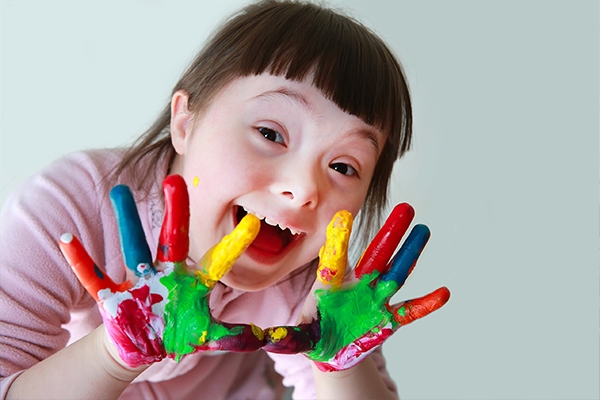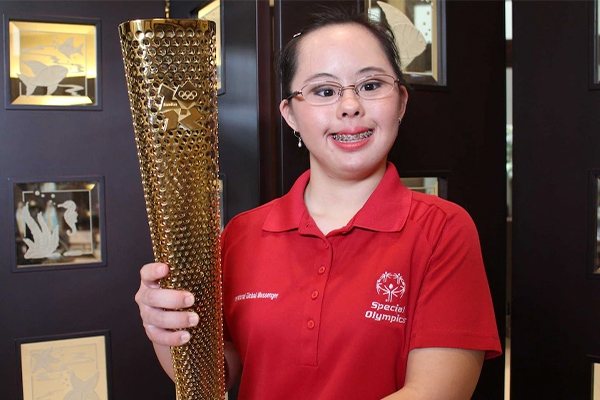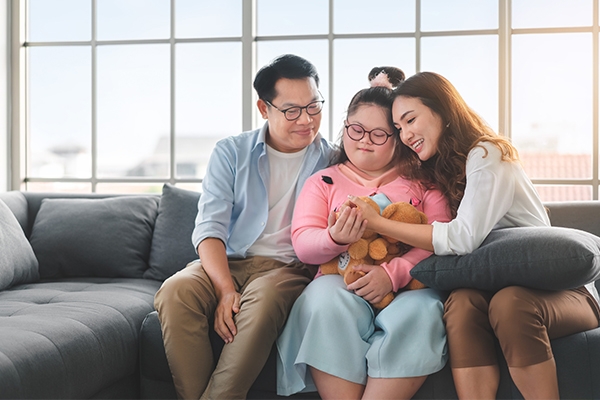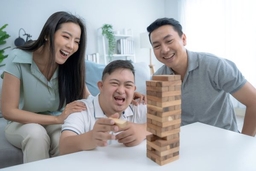Be the Toughest Support for Your Down Syndrome Child

Stephanie Handojo, a Down syndrome child, set a MURI record in 2009 by playing piano for 22 songs nonstop. She was one of the torchbearers for the London Olympics in 2012. "I'm able to do this because of my parents' support," she stated.
Children with Down syndrome face numerous stigmas, including being incapable of doing anything, having no future, and being unable to live independently.
Parents who learn their child has Down syndrome may also experience a range of emotions, including sadness, heartbreak, and difficulty accepting the truth. When the unavoidable reality sets in, they worry about what others will think and about the future.
Research proves that despite the low number, 5% of the 2,044 respondents said they felt ashamed to have a child with Down syndrome.
Down syndrome is a blessing

Down syndrome is a genetic disorder caused by an extra copy of chromosome 21 in a child. This condition causes developmental delays (physical, motor, or cognitive) as well as physical appearance differences.
Down syndrome can be inherited. There is no evidence that socioeconomic status or race have an impact. However, several factors are believed to raise the chance of a baby being born with this condition, such as if the mother is over 35 years old or has a genetic history (other family members with Down syndrome) at the time of birth.
There was no known way to prevent Down syndrome until now. Medical tests, on the other hand, can inform parents about it. Parents can seek medical advice before becoming pregnant. Prenatal diagnostic tests can also detect the presence of Down syndrome.
Down syndrome is not a rare condition. According to the WHO, one in every 1,000 babies is born with Down syndrome. Around 3,000 to 5,000 children are born with Down syndrome each year. There is no precise data on the number of cases in Indonesia. However, the Baseline Health Research 2018 results show that the number of Down syndrome cases in Indonesia is increasing.
Down syndrome is a lifelong condition. Children with Down syndrome are just like any other child. They, too, learn and dream. They may require more time to develop and learn, but that doesn’t mean they cannot. According to studies, children with Down syndrome can recognize emotions and understand the expressions of others.
The good news is that children with Down syndrome are living longer lives. In 1960, the average life expectancy for children with Down syndrome was less than ten years. Today, they can live to be 50–60 years old!
Of course, nothing like this happens by chance. It is important to have the support of family, friends, and loved ones.
Children with down syndrome can achieve great things

Stephanie Handojo exemplifies how children with Down syndrome can achieve great things. And not just her. Samuel Santoso is a fantastic painter, and Namira Zania Siregar is a stunning model.
According to Dr. Aisah Indati, M.S., a special needs child psychologist, parents are the key to children with Down syndrome's independence. Parental acceptance and willingness encourage the child's growth and development.
We can see this from Nini Andrini, Namira's mother. She supports her daughter's needs by recognizing her talents. When she knew Namira liked to dance, she tried to find a dance school to help her learn to dance. Eight years later, Namira has become an assistant dance teacher for a class of special needs children.
Support your child at all times

Allow your child to learn independently. Create a routine of activities for the child, for example, and encourage them to stick to it. Also, teach positive values so that your child can see the world positively and socialize well.
When a child learns something and makes a mistake, instead of saying, "That's wrong," say, "Try again." Then give them the correct information.
Spend time together doing activities like playing, reading, or walking. These activities help you identify your child's interests and talents.
Physical therapy, speech therapy, occupational therapy, behavioral therapy, and job therapy are all options for your child. Please be available to your child during their treatments!
Join the community
Being the parent of a child with Down syndrome is an honorable life experience. It may sound cliché, but it's true. Not everyone gets the chance to be a tough parent. You should be grateful.
The next step is acceptance, followed by sincerity. It is not your fault that your child was born with Down syndrome. Don't blame yourself.
Parents of children with Down syndrome will engage in different activities than other parents. Aside from daily activities, you and your child must visit doctors or therapists on a regular basis. Remember to take care of yourself during this hectic period. Solicit the support of close friends or family members. While you wait for your child's session with the experts, do something you enjoy, such as watching funny videos or anything else.
Talk to those you trust. You can at least lessen the burden you carry alone by sharing your stories. You can also speak with other parents whose children have Down syndrome. You can follow Komunitas Peduli Down Syndrome (KPDS) and Persatuan Orang Tua Anak Dengan Down Syndrome (POTADS), two Indonesian community supports. Through a community, you and other parents can share concerns, information, and support one another.
Raising a child with Down syndrome is difficult. There will be times when you feel exhausted and hopeless. But don't give up! Take care of both your children and yourself.



